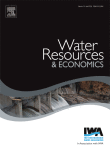
Water Resources and Economics
Scope & Guideline
Empowering Policy through Water Economics Research.
Introduction
Aims and Scopes
- Economic Valuation of Water Resources:
Exploring the economic implications of water scarcity, quality, and management practices, this area focuses on quantifying the value of water in various sectors, including agriculture, industry, and urban settings. - Water Policy and Governance:
Analyzing the effectiveness of water management policies, governance structures, and regulatory frameworks, this theme emphasizes the socio-economic impacts of water governance on different communities. - Technological Innovations in Water Management:
Investigating the role of technology in enhancing water use efficiency, pollution control, and resource allocation, this area includes studies on smart water meters, irrigation technologies, and treatment solutions. - Environmental and Health Impacts:
Assessing the direct and indirect effects of water quality and availability on public health and ecosystems, this research area emphasizes the importance of clean water access and its implications for community well-being. - Behavioral and Socioeconomic Factors:
Examining how social behaviors, preferences, and economic factors influence water consumption and conservation practices, this theme integrates psychology and economics to foster sustainable water use.
Trending and Emerging
- Impact of Climate Change on Water Resources:
There is an increasing focus on how climate change affects water availability, quality, and management strategies, reflecting the urgent need for adaptive measures in the face of changing environmental conditions. - Integration of Behavioral Economics in Water Use:
Emerging studies are exploring how behavioral economics can inform water conservation strategies, highlighting the importance of consumer behavior and social norms in promoting sustainable water use. - Resilience and Risk Management in Water Systems:
Research is trending towards understanding the resilience of water systems to various stressors, including natural disasters and economic shocks, emphasizing the need for robust risk management frameworks. - Technological Advancements and Smart Water Solutions:
The adoption of smart technologies and innovative solutions for water management, such as IoT applications and data analytics, is gaining traction, reflecting the industry's shift towards modernization and efficiency. - Transboundary Water Issues and Cooperation:
As global water resources become increasingly stressed, there is a growing emphasis on transboundary water management and cooperative frameworks, particularly in regions facing geopolitical tensions over shared water resources.
Declining or Waning
- Traditional Water Resource Allocation Methods:
Research focusing on conventional water allocation methods has decreased, possibly due to the increasing recognition of the need for more integrated and innovative approaches that consider economic, environmental, and social factors. - Historical Water Management Practices:
Studies centered on historical contexts of water management are waning, as contemporary issues such as climate change and urbanization take precedence over retrospective analyses. - Single-Factor Analysis of Water Issues:
There is a noticeable decline in studies that analyze water issues through a single lens (e.g., only economic or only environmental), reflecting a growing trend towards interdisciplinary approaches that encompass multiple factors.
Similar Journals

Water Economics and Policy
Navigating the Complexities of Water Economics and GovernanceWater Economics and Policy is a leading academic journal specializing in the interdisciplinary examination of water-related economic issues and policy frameworks. Published by WORLD SCIENTIFIC PUBL CO PTE LTD in Singapore, this journal serves as a pivotal platform for sharing innovative research, empirical studies, and theoretical developments that address the complex interactions between water resources management, economic sustainability, and policy formulation. With its impact factor reflecting its growing influence in the field, Water Economics and Policy is indexed in several key categories, ranking in the third quartile in areas such as Business and International Management, Economics and Econometrics, and Water Science and Technology. Launched in 2015, the journal embraces an open-access approach to enhance the dissemination of knowledge and insights among researchers, policymakers, and practitioners. Its commitment to fostering dialogue on critical water issues makes it an invaluable resource for anyone seeking to advance their understanding of water economics and contribute to the sustainable management of water resources.
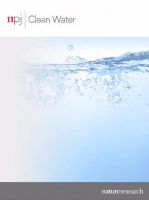
npj Clean Water
Transforming water challenges into actionable insights.npj Clean Water, published by NATURE PORTFOLIO, is a premier open-access journal dedicated to advancing the field of water science and technology. Since its launch in 2018, this innovative publication has quickly established itself as a leading platform for original research and policy discussions concerning clean water access and quality. With an impressive impact factor and categorized in the Q1 Quartile across multiple environmental science disciplines—including management, monitoring, pollution, and waste management—npj Clean Water stands out for its rigorous peer-review process and commitment to disseminating high-quality research. Researchers, professionals, and students involved in water-related challenges will find invaluable insights that address critical environmental issues and promote sustainable practices. Access to articles is freely available, encouraging global collaboration and knowledge sharing within the water sector. This journal embodies a significant step towards achieving innovation and policy advancements in the pursuit of a cleaner, safer water future.

WATER RESOURCES MANAGEMENT
Bridging Theory and Practice in Water Resource EngineeringWATER RESOURCES MANAGEMENT is a prestigious journal published by SPRINGER, renowned for its contribution to the fields of Civil and Structural Engineering as well as Water Science and Technology. Operating since 1987, this journal has established itself as a vital resource for researchers, professionals, and students alike, boasting a remarkable impact factor and a Q1 designation in both relevant categories as of 2023. The journal is indexed in Scopus, achieving commendable ranks—34th in Environmental Science and 62nd in Civil and Structural Engineering, placing it in the top percentiles of its fields. Although it does not offer open access, WATER RESOURCES MANAGEMENT serves as a comprehensive platform for disseminating innovative research, discussions, and case studies that address the global challenges of water resource management. With a commitment to fostering knowledge and advancing the understanding of integrated water management solutions, this journal is indispensable for anyone engaged in these critical scientific domains.
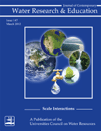
Journal of Contemporary Water Research & Education
Exploring Contemporary Issues in Water ManagementJournal of Contemporary Water Research & Education is a leading publication in the field of water resources, committed to advancing the understanding and management of water-related issues through innovative research and education. Published by WILEY, this journal serves as a vital platform for researchers and practitioners to disseminate knowledge on contemporary water challenges, management strategies, and environmental policies. With an ISSN of 1936-7031 and an E-ISSN of 1936-704X, it provides a wealth of peer-reviewed articles that are essential for anyone interested in sustainable water resource practices. Although it does not currently operate under an open-access model, the journal's comprehensive content remains accessible through various institutional and personal subscriptions. As we face increasing water scarcity and quality issues globally, the Journal of Contemporary Water Research & Education strives to foster collaboration and innovation, playing a pivotal role in equipping scholars, professionals, and students with the knowledge necessary to tackle these pressing challenges.

Frontiers in Water
Advancing sustainable solutions for global water challenges.Frontiers in Water is a leading open-access journal dedicated to advancing the field of water science and technology. Published by FRONTIERS MEDIA SA in Switzerland, the journal has been a vital resource for researchers and professionals since its inception in 2019. With an impressive Q2 ranking in the Water Science and Technology category for 2023 and a notable position within the Scopus rankings (Rank #113/261), it reflects the growing importance of water issues in a rapidly changing world. The journal provides a platform for groundbreaking research and innovative solutions to the challenges facing water resources globally, ensuring that vital knowledge is accessible to a diverse audience. Researchers are encouraged to engage with its comprehensive articles covering various aspects of water science, including hydrology, pollution control, and sustainable management practices. As an open-access journal, Frontiers in Water enables unrestricted access to its content, fostering collaboration and knowledge-sharing among academics, industry professionals, and policy-makers. Join the movement towards sustainable water management and contribute to this dynamic scientific community.

H2Open Journal
Connecting minds to innovate in water sustainability.H2Open Journal, published by IWA Publishing, is a leading open-access platform established in 2018, dedicated to advancing the field of water science and technology. With its E-ISSN 2616-6518, this journal caters to a global audience, providing essential research insights that span various domains, including environmental science, management, monitoring, policy, law, and water science. The journal has achieved notable recognition in recent years, holding a Q3 ranking in three distinct categories within the 2023 environmental science metrics. Its commitment to open access ensures that valuable research is freely available to researchers, professionals, and students alike, fostering collaboration and innovation in water-related disciplines. With a focused publication strategy spanning from 2018 to 2024, H2Open Journal is poised to be a pivotal resource for addressing critical challenges in water sustainability and management, reflecting the pressing need for informed actions in the face of global water issues.
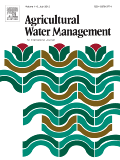
Agricultural Water Management
Exploring the Nexus of Agriculture and Water SustainabilityAgricultural Water Management, published by ELSEVIER, is a leading journal in the fields of agronomy, soil science, and water resource management. With an impressive impact factor reflecting its relevance and authority—ranking Q1 in multiple categories including Agronomy and Crop Science, Earth-Surface Processes, Soil Science, and Water Science and Technology—the journal serves as a critical platform for groundbreaking research and innovative practices aimed at enhancing agricultural sustainability and efficient water use. Operating since 1976, it has maintained a strong commitment to disseminating high-quality scholarly work that addresses contemporary challenges in water management related to agriculture across diverse environments. Readers can expect to find a spectrum of research articles, review papers, and case studies that not only contribute to scientific knowledge but also inform policy and practice for professionals in the field. While not open access, the journal remains a pivotal resource for researchers, practitioners, and students keen to advance their understanding of agricultural water issues and their implications for the global ecosystem.

Water Conservation Science and Engineering
Pioneering Research in Water Science and EngineeringWater Conservation Science and Engineering, published by SPRINGERNATURE, is a vital academic journal dedicated to advancing the fields of environmental engineering, ocean engineering, waste management, and water science and technology. Since its inception in 2016, the journal has quickly established itself within the academic community, achieving a commendable Q3 ranking across multiple categories in 2023. With an ISSN of 2366-3340 and an E-ISSN of 2364-5687, it is accessible to a global readership eager to explore the latest research and innovations in water conservation and sustainable practices. Although currently not open access, the journal is committed to publishing high-quality scholarly articles that provide insights into effective water management strategies, innovative engineering solutions, and the critical importance of preserving our water resources. Based in Singapore, Water Conservation Science and Engineering aims to foster interdisciplinary collaboration among researchers, professionals, and students, making it an essential resource for anyone passionate about environmental sustainability and preservation.
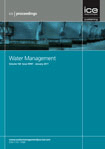
PROCEEDINGS OF THE INSTITUTION OF CIVIL ENGINEERS-WATER MANAGEMENT
Elevating Civil Engineering with Cutting-Edge Water SciencePROCEEDINGS OF THE INSTITUTION OF CIVIL ENGINEERS-WATER MANAGEMENT is a prestigious journal published by Emerald Group Publishing Ltd, dedicated to advancing the field of water management within civil engineering. With an ISSN of 1741-7589 and an E-ISSN of 1751-7729, this journal delivers peer-reviewed research that spans the critical intersections of water science and technology, contributing valuable insights into sustainable water management practices. As evidenced by its ranking in the 2023 Scopus categories, where it holds the Q3 quartile in Water Science and Technology, and a respectable position among its peers, the journal remains a vital resource for researchers, professionals, and students in the field. Though it is not an open-access journal, it offers accessible subscription options that facilitate worldwide dissemination of knowledge, enhancing its role as a fundamental reference point for cutting-edge developments in water management. For those looking to publish or stay updated on the latest research trends, this journal serves as an essential platform for promoting innovation and sustainable practices in civil engineering and water resources management.
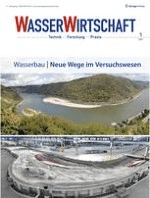
WasserWirtschaft
Elevating discourse on critical water resource challenges.WasserWirtschaft is a renowned academic journal dedicated to the critical field of water science and technology. Published by SPRINGER VIEWEG-SPRINGER FACHMEDIEN WIESBADEN GMBH, this journal has been a vital resource for researchers, professionals, and students since its inception in 1973, covering an extensive range of topics pertinent to water management, engineering, and environmental sustainability. Although it is currently ranked in the Q4 category of the Water Science and Technology category as per the 2023 Scopus metrics, with a ranking of #246 out of 261, the journal is committed to enhancing the discourse surrounding water resource management through high-quality, peer-reviewed articles. The journal does not operate on an Open Access basis, ensuring that its content is curated and accessible to subscribers while promoting rigorous academic standards. With its historical significance and focus on contemporary water-related challenges, WasserWirtschaft remains an essential publication for stakeholders aiming to advance the science and technology of water resources in a rapidly changing world.